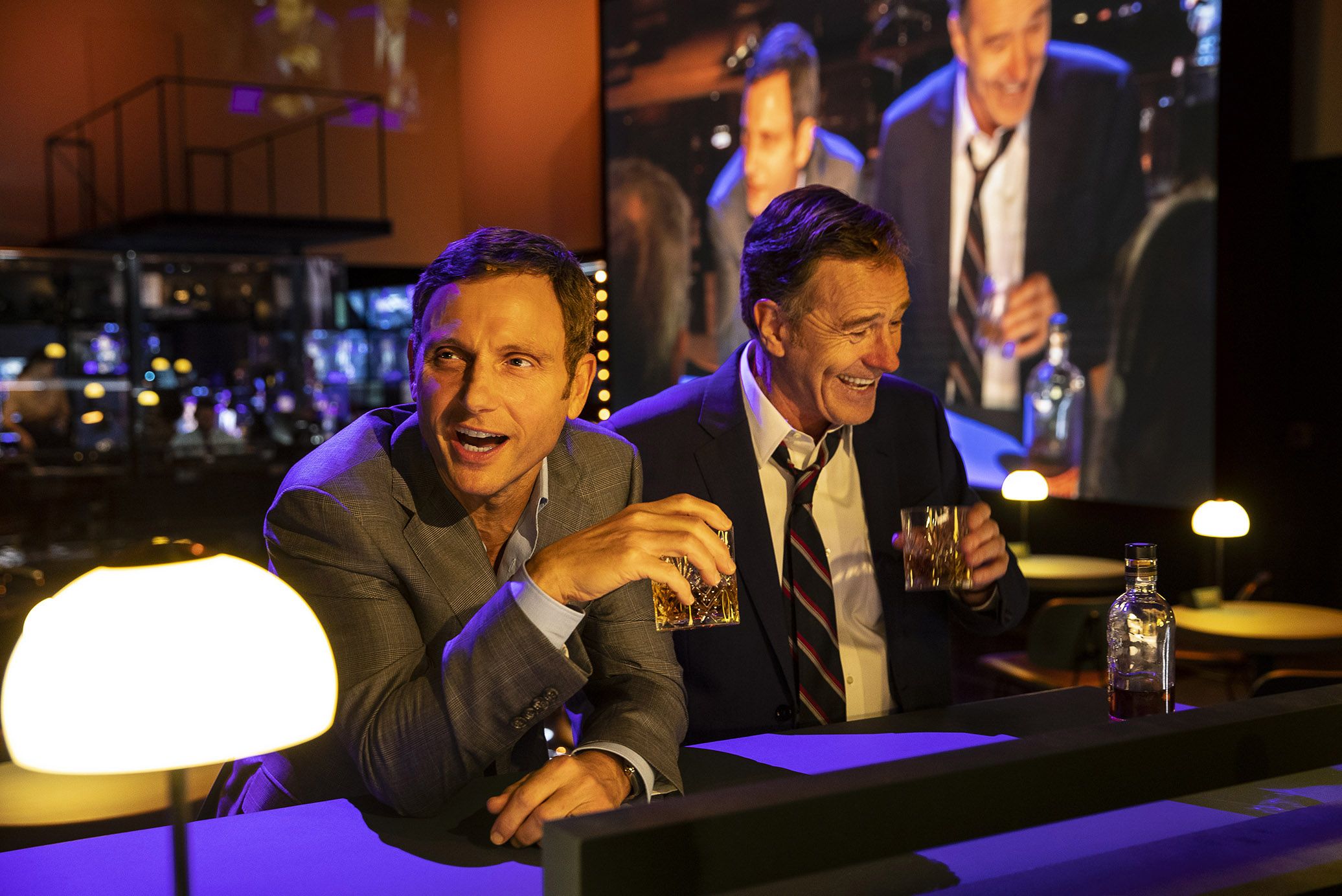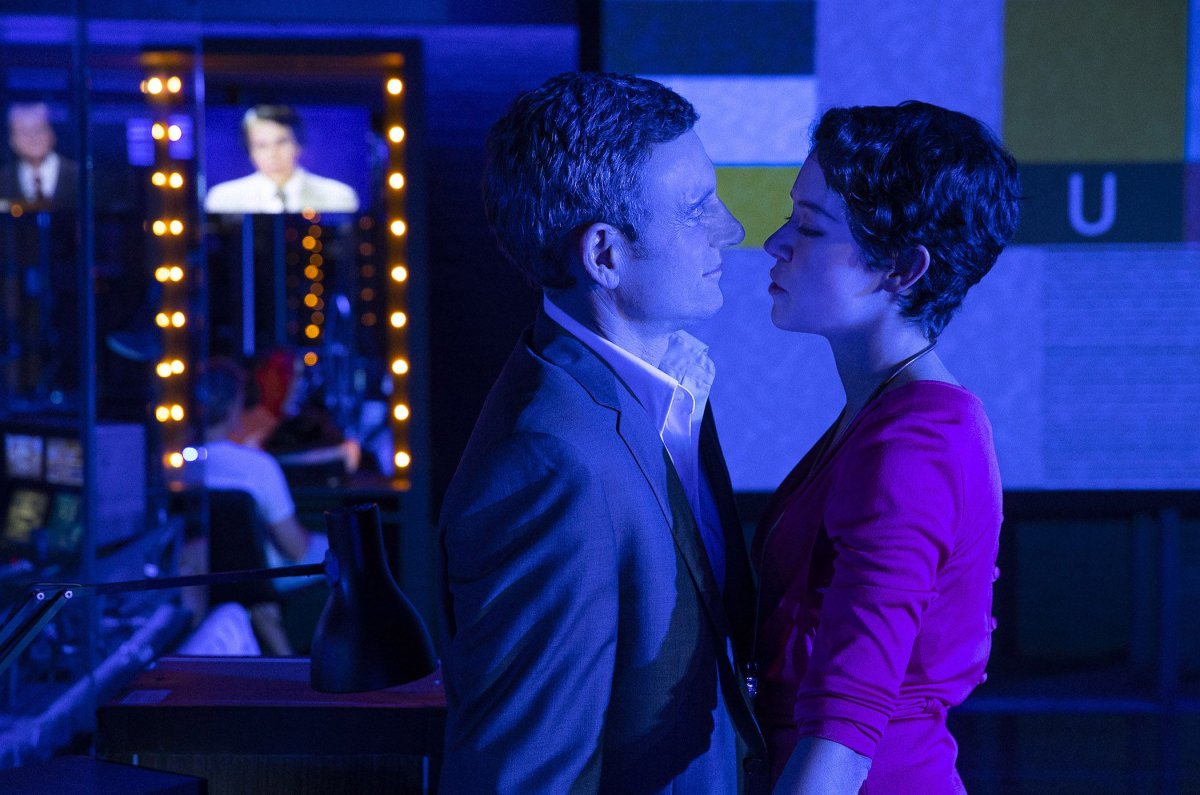
Network is about as close as Broadway gets to experimental theater these days. It is a somewhat realistic — albeit incredible at times — play within a phantasmagoria of video screens, overlapping, ultra-fast-paced dialogue and unorthodox staging. It is also a television news show, a tightly scripted (but spontaneous) reality show and a mixed-media installation. The Alice in this Wonderland is Max Schumacher, who is given a brilliantly understated portrayal by Tony Goldwyn.
"Goldwyn" is a name more commonly associated with old Hollywood than Broadway. Samuel Goldwyn — the G in MGM — was his grandfather. His other grandfather, Sidney Howard, wrote Gone With the Wind and the screen version of the Sinclair Lewis novel, Dodsworth. Goldwyn has acted in and directed movies and television for over 30 years, such as the hit series Scandal, but he makes regular appearances on the New York stage, most recently in Promises, Promises in 2011. Right now he is playing opposite Bryan Cranston as Howard Beale.
Goldwyn came to Network in a fortuitous way. "A couple of years ago I was asked to do a reading of the screenplay of Network at the Los Angeles County Museum of Art. Jason Reitman curates ["Live Read,"] a reading series of great screenplays. I said, 'Sure.' After that, I inquired about the rights. I said, 'Why hasn't this been done on stage before?' and I found out Ivo [van Hove] was doing it in London. Two years later, I got an email from Bryan Cranston [about performing in it]." Goldwyn and Cranston had worked together on a miniseries for HBO From Earth to the Moon — "I was Neil Armstrong, he was Buzz Aldrin."
I saw Network soon after it was released, and at the time, I thought it was funny, a little exaggerated but on the mark. When I suggest this play is the 1976 movie on steroids, Goldwyn counters, "But what we are living through in our present time is what [screenwriter] Paddy Chayefsky was writing about on steroids." I saw it again around the time of the O.J. Simpson trial, and things had changed. Goldwyn says, "The O.J. episode was the seminal event of news as entertainment."
Even the simplest role in the simplest play presents a unique set of problems for an actor. Max is a complex role with a lot of subtext, and Network is about as far from a simple play as Broadway is likely to get. So the subtlety of Goldwyn's performance might be lost on some theatergoers.
Especially on that set. From an actor's point of view, there is the technical matter navigating the set — physically and mentally. Video screens, cables and cameras and camera operators are everywhere. The show features so much movement, one half-expects to find a choreographer/traffic cop credited in the Playbill. (There is none that I could find.)
In one respect, the mass of video screens work to the advantage of Goldwyn, who — as anyone who has seen the movie Ghost: Look up Carl Bruner's computer scene in that movie — knows, has a very expressive face. Look away from the ball, as they say in sports, when he is on a video screen, and even people in the balcony can catch the nuances of Max's mental state. Normally, a play with mics and video screens detracts from the theatrical experience, but not here.
When I ask Goldwyn if he notices the dozens of video screens, he says, "Yeah! They're ever-present, but I don't pay any attention to them when I am in a scene.
"As an actor, I try to create a sense of place for myself, otherwise I find it very hard to concentrate. Or I become too aware of the audience and the artifice. The stage is kind of this amorphous netherworld. There is no real anchors to the environment other than the news set, the booth and the bar."
With all that craziness, I point out that the audience seems to know where to focus. "Lots of people have said that, he says. "That's a credit to Ivo's brilliance."
The next thing Goldwyn had to do was get 1976 movie out of his mind. "Once the schedule worked out and I knew I was going to do this," he says, "I purposely did not want to see the movie. I did not want Bill Holden in my head while I am doing this." Holden was nominated for an Oscar for his portrayal of Max.
Goldwyn's backstory for Max, which he says "is all boring and pretentious," includes Max being born in Chicago, writing for Stars and Stripes during World War II, working on radio and television for Edward R. Murrow. Most of this, he says, does not make its way overtly into the play.
"It's been an interesting challenge this role because Max is in reaction to pretty much everything that's been happening. He is trying to hold the fort together. And it is all crumbling down around his ears. At first, he is the moral center, but he goes off when he loses his power," Goldwyn says. "Another challenge is that a lot of what happens to Max happens offstage. He brings that with him into the scenes. It's different from when you are driving the scene."
"The scene when Max confesses to having an affair to his wife Louise, he is reacting. He's dealing with this tornado which comes at him," the actor adds. This scene almost single-handedly got Beatrice Straight her Oscar. It's all dialogue, and it is riveting.
One of the perks of playing a Chayefsky character is getting to speak some of the most literate, intelligent dialogue written for actors. Even though he wrote mostly for film and TV, seemed at heart a playwright. He made no concessions to the so-called lowest common denominator. "The language in this play is great. It one of the great things for an actor," Goldwyn says. At least once in every work, Chayefsky is sure to send someone to the dictionary, and send others into autocorrect hell: Max calls himself "peccant" (which means 'sinning') and Goldwyn remembers "having to look up the word immane, which is an archaic word that [Arthur] Jensen uses [meaning 'huge' or 'monstrous']." The latter is only in the movie though.
Max is the heart of the play; at least in the beginning, until he has an affair with the devil in the person of Diana Christensen (Tatiana Maslany). I asked Goldwyn why Max fell from grace.
"It's very human to me," he says. "I can relate. Max lost his power. There are two steps to his affair with Diana.
"The first one is a dalliance. He gets fired because he allows Howard to go on, and Howard kind of screws Max over buy saying 'bullshit' in front of the camera. He gets disenfranchised. Then [Chairman of the Board Edward] Ruddy wants him back. So Max is back in control. He is feeling his oats, and Max and Diane have this tête-à-tête. It may not be the first time Max has done that, but he's not like Howard. I never said this to Bryan, but I feel like Howard was much more of a dog than Max." I assured him he secret is safe with me.
"[The affair] is a function of loss of power and regaining power. And Max is feeling flush in his manhood. And there is this young girl he dominates, and that is erotic to him. Then all hell breaks loose, and Max is out [again].
"The second time is serious. I think Max is in a massive depression. I've had friends who've lost their careers in their 50s when they're too young to retire. Guys who were quite high-powered, and suddenly they're out. Especially in these circumstances, where Max knows his was right and Howard has gone on to become this megastar. Max is in this vulnerable position — that is the scene on the street," Goldwyn says.
This intimate scene, he says, which literally takes place on the street, is "wild. There is no security there." It culminates indoors in one of the more notorious sex scenes. For those who have seen the movie, it is different here.
Goldwyn has clearly given a lot of thought to this Faustian relationship.
"Diana is young and into him," he says, "and she is his destroyer. There is a kind of aggressiveness to it, I think. And sex is a metaphor for power and human connection, which I think Max is devoid of. It's a kind of sex he has not had with Louise [his wife] for a very long time, if ever."

Goldwyn talks about a podcast he had listened to on "people who choose the wrong people because those people will enfranchise them. People like to be with winners. Max knows it's f**ked up when he is doing it, but it's a drug.
"That's what makes the scene with Louise so powerful to me and the way Max reacts: He knows he is destroying his life, but he is powerless to stop himself from doing it. That's why it is so tragic.
"It doesn't always happen, but often when I do that scene, tears come to me."
Max's arc is also the audience's. Howard can go crazy, get mad as hell and — maybe even literally — chew the scenery. But Max is everyman, who can only look on and wonder, gape and try to cope. He gets bored and depressed with all the craziness, and in his own quiet, tragic way, he also gets mad as hell. And Goldwyn brings all this out in a stunning performance that hopefully will not go unnoticed at awards time.
You can see Tony Goldwyn on stage, screen and television in Network at the David Belasco Theatre.
For more information on Network, go to NetworkBroadway.com.
Uncommon Knowledge
Newsweek is committed to challenging conventional wisdom and finding connections in the search for common ground.
Newsweek is committed to challenging conventional wisdom and finding connections in the search for common ground.
About the writer
To read how Newsweek uses AI as a newsroom tool, Click here.








